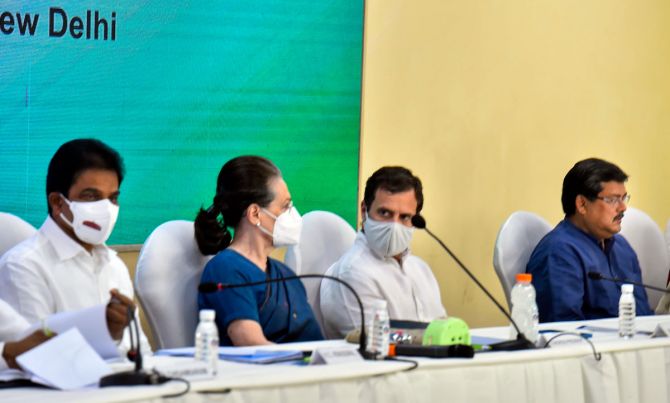'Fixing accountability in the Congress must be addressed on a war footing.'
'It is impossible for Sonia Gandhi to know each and every party worker, so she has to rely on advisors.'
'If they guide or misguide, the blame should go to them.'

Anant Gadgil is known as one of the most articulate Congress leaders in Maharashtra.
As a spokesman for the party, he has done the job in one of the most difficult times for the organisation.
As an MLC, he left a mark on the proceedings of the legislature through his speeches.
"Wrong feedback has a cascading effect on the fortunes of the party at all levels from Parliament to state assemblies to the municipal corporations," Gadgil tells Rediff.com Senior Contributors Sunil Gatade and Venkatesh Kesari.
What do you see as the causes for the continued reverses for the Congress since Narendra Modi's emergence and what are the corrective measures?
There is a growing feeling among Congress workers, true or false, that original Congressmen are not being rewarded.
Those who left the party and later rejoined or those who came from other parties are rewarded.
I will not use the word 'loyalists' which is much misused. I will say original Congress workers.
If I have to cite an instance, then you see Narayan Rane, the former CM joined from the Shiv Sena and never got settled in the Congress but with his induction, some aspirants got ignored.
When children of senior leaders like Pranab Mukherjee, Jitendra Prasada, Madhavrao Scindia and Santosh Mohan Dev and 15-20 others left the Congress, it sent out wrong signals. Many felt that they left even after getting everything.
But the negative signal among the voters was that if these people are leaving, then there is something wrong with the Congress.
The Congress did not take the signal correctly.
Besides, it must be admitted that the BJP and the prime minister realised that India and especially progressive states like Maharashtra are becoming more urban.
In Maharashtra, 49 per cent are now living in urban areas.
The Congress concentrated more on rural issues, leaving a feeling among urbanities that they have been left high and dry.
Through the Smart City project, the BJP succeeded in connecting with the urban voter while the Congress lost in urban areas due to too much concentration on rural issues.
It is a different matter that later the Smart City project turned out to be bogus.
The issue of fixing accountability in the Congress must be addressed on a war footing.
It is impossible for Sonia Gandhi to know each and every party worker and so she has to rely on advisors.
If they guide or misguide, the blame should go to them.
A sort of vicious circle is created when an AICC observer is appointed for a poll bound state. If one has good relations with the observer, then his ticket is final. This needs to be changed. Why is there no accountability?
Take my own case. My father (the late V N Gadgil) and grandfather (the late Kakasaheb Gadgil) won the Pune Lok Sabha seat with over a two lakh margin.
I had not formally applied in 2014 or 2019. The feedback given to the high command was that I have no elective merit.
Those who were given tickets lost by 3.5 lakh to 4 lakh (350,000 to 400,000) votes.
What I am trying to drive home is that how wrong feedback has a cascading effect on the fortunes of the party at all levels from Parliament to state assemblies to the municipal corporations.
If you look at all the assembly seats in Pune, the Congress lost them all both in 2014 and 2019.
It makes one wonder whether those who had sought tickets had done so for their commitment to the Congress or for 'adjustment'.
When the late V N Gadgil was at the helm of affairs in the city some two decades back, the Congress had secured 85 out of 143 seats in the Pune Municipal Corporation.
Now, it has an absolute BJP majority in a House of 163. Congress corporators are just nine.
You will see how Congress fortunes have nosedived in the past more than a decade by attaching the party to the apron strings of a leader having a lot of resources.
If you look at Maharashtra, it boasts the tradition of chintan shivirs. The state was far ahead in that. The Employment Guarantee Scheme was finalised at such a shivir in Nashik during the days of the late Y B Chavan. It later became a national scheme under Prime Minister Manmohan Singh.
Similarly, the Congress session at Awadi led to the start of the cooperative movement in Maharashtra. The Nagpur session too proved to be historic.
Now there is no such brainstorming in the party.
The party must realise that the youth whom Rajiv Gandhi gave voting rights at 18 has now become the Facebook/Twitter generation.
How much of the youth has the party attracted towards itself through the NSUI and Youth Congress?
There was a time when there was respectful fear in the party about the Youth Congress.
Now the NSUI has only remained confined to visiting cards. How many of their activists are visiting colleges at a time when social media is full of anti-Muslim and 'how Hinduism is great' posts?
The Congress approach to attract people from different castes by giving positions of power to leaders from the community is no longer of any use as the party is no longer benefiting from it.
How do you look at Maharashtra where the party looks lost despite being part of the ruling MVA? What needs to be done?
When the MVA was being formed some two-and-a-half years back, the late Ahmed Patel had come to Mumbai.
At that time, he took me aside and asked my opinion on forming a government with the Shiv Sena.
I told him that to keep the BJP out of power, the Congress should be part of the Aghadi, but should in no case join the government as it would finish off the party.
The impression one gets today is that only the Sena and the NCP are active as the media is full of Sanjay Raut and Nawab Malik till his arrest recently.
Three ministers of the Congress, on different occasions but at public functions, have lamented that they have no say in the running of the government.
In one of these functions, the minister was asked as to why he was not resigning if he had no voice.
There have been laments that adequate funds are not made available to some ministries.
Another thing that needs to be done by the party to gear itself up is to promote the performers as against favouring community leaders.
The notion that promoting community leaders would prompt the community to support the party is now proving false.
A matter for concern is that the social base of the party has been seriously eroded.
Even a section of Muslims are now covertly supporting the BJP taking the view that 'at least we can live peacefully'.
At one time, Muslims and the scheduled castes were voting solidly for the Congress.
Now the majority Maratha community has remained mostly with the Sena and the NCP.
All this calls for change in the selection process of candidates by the Congress.
When it was decided that no post be given to those defeated in the elections, a leader who was defeated in the Lok Sabha was made leader of the Congress in the Rajya Sabha.
While the ultimate responsibility is of the leadership, blame those who gave wrong advice/misguided the Congress President.
What should Rahul and Priyanka Gandhi do in a crisis situation?
There is no shortcut in establishing connect with the ordinary worker.
Even Indira Gandhi used to have her janata darbarS in the morning to get feedback on what is happening around the country.
Rajiv Gandhi had started train journeys to reach out to the common man.
The situation today is that the leader does not meet the common man.
Whatever might be the BJP propaganda, Rahul comes out best while informally interacting with the media.
Rahul should address press conferences, but speak briefly there.
Instead he should do informal interactions with the media wherever he goes.
He needs to travel a lot and visit states and meet ordinary workers.
Feature Presentation: Aslam Hunani/Rediff.com











